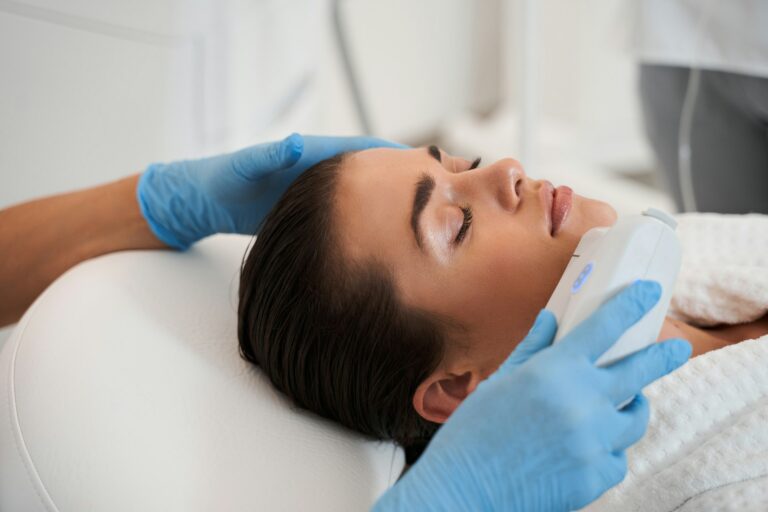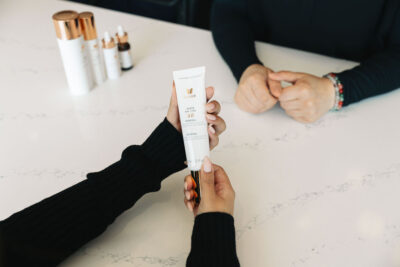October 1, 2024
Dark spots can be a common skin issue affecting people of all ages. These spots, also known as hyperpigmentation, appear when certain areas of the skin produce more melanin, the pigment that gives skin its colour. While dark spots don’t pose any serious health risks, they can affect how you feel about your appearance. Knowing how to lighten them can boost your confidence and enhance your skin’s appearance.
Understanding Dark Spots: Causes and Types
Dark spots, or hyperpigmentation, occur when an area of the skin produces more melanin than usual. Melanin is the pigment that gives your skin its colour. Several factors can cause this overproduction, leading to various types of dark spots.
- Sun Exposure: Ultraviolet (UV) radiation from the sun is a common cause of dark spots. Long-term exposure without proper protection can lead to sunspots or age spots, usually appearing on areas like the face, hands, and shoulders.
- Hormonal Changes: Hormonal fluctuations can also trigger dark spots. For example, melasma is a type of hyperpigmentation that often occurs during pregnancy or with the use of birth control pills. This condition usually results in larger patches of dark skin on the face.
- Skin Injuries: Any trauma to the skin, including cuts, burns, or acne, can lead to post-inflammatory hyperpigmentation. This type of dark spot appears after the skin has healed from the injury.
- Medications: Some medications can increase the likelihood of dark spots developing on your skin. These include certain antibiotics, chemotherapy drugs, and medications used to treat mental health disorders.
Over-the-Counter Treatments for Dark Spots
Many over-the-counter treatments are available to help lighten dark spots. These products often contain active ingredients that target hyperpigmentation and can be easily incorporated into your daily skincare routine.
- Hydroquinone: Hydroquinone is a common ingredient in many skin-lightening creams. It works by reducing the number of melanocytes in the skin, which decreases melanin production. Look for products with 2% hydroquinone for safe over-the-counter use.
- Vitamin C: Vitamin C, an antioxidant, can brighten the skin and reduce the appearance of dark spots. It helps to neutralize free radicals and inhibit melanin production. Serums containing vitamin C are popular and can be applied daily.
- Retinoids: Retinoids, derived from vitamin A, promote cell turnover and prevent the formation of new dark spots. Over-the-counter retinol creams can be effective in gradually lightening hyperpigmentation.
- Alpha Hydroxy Acids (AHAs): AHAs, like glycolic acid and lactic acid, help exfoliate the skin, removing dead skin cells and promoting the growth of new, evenly pigmented cells. Regular use can lighten dark spots over time.
- Niacinamide: Also known as vitamin B3, niacinamide can inhibit the transfer of melanin to skin cells, reducing dark spots and evening out skin tone. It’s often found in serums and creams designed for hyperpigmentation.
Professional Procedures to Lighten Dark Spots
If over-the-counter products are not giving you the results you want, professional procedures can offer more effective ways to lighten dark spots. Dermatologists have several treatments that target hyperpigmentation more precisely and can provide faster, more noticeable results.
- Chemical Peels: Chemical peels use acids like glycolic, lactic, or salicylic acid to exfoliate the top layers of the skin. This removes dead skin cells and stimulates the growth of new skin. Chemical peels can vary in strength, and a dermatologist can recommend the right one for your skin type.
- Microdermabrasion: Microdermabrasion is a procedure that sands away the outer layer of skin using a special device. This helps to diminish dark spots and gives the skin a smoother, more even appearance. It’s a relatively quick procedure and usually requires little to no downtime.
- Laser Therapy: Laser treatments use concentrated light to target and break down dark spots. This procedure is highly effective and can target specific areas without damaging the surrounding skin. Different types of lasers are available, and a dermatologist can determine which one is best suited for your needs.
- Cryotherapy: In this treatment, liquid nitrogen is applied to the dark spots, freezing and destroying the pigmented cells. The treated skin then peels off, revealing lighter skin underneath. Cryotherapy is usually quick, but it can be uncomfortable, so discussing pain management with your doctor is important.
- Prescription Creams: Dermatologists can prescribe stronger creams containing hydroquinone, tretinoin, or corticosteroids. These creams are more potent than over-the-counter options and can provide more dramatic results in lightening dark spots.
Natural Remedies and Lifestyle Changes
While professional treatments are effective, making lifestyle changes can also help manage dark spots. These methods may take longer to show results but can be beneficial when used consistently.
- Sunscreen: Prevention is crucial in managing dark spots. Use a broad-spectrum sunscreen with SPF 30 or higher every day to protect your skin from further sun damage. Reapply every two hours when outside.
- Healthy Diet: A balanced diet rich in fruits, vegetables, and antioxidants supports overall skin health. Foods like berries, green leafy vegetables, and nuts can help maintain an even skin tone and prevent dark spots.
- Hydration: Drink plenty of water to keep your skin hydrated and flush out toxins, promoting a clear, even complexion.
Dark spots can be frustrating, but understanding the causes and exploring various treatments can help you effectively manage them. From over-the-counter creams to professional procedures and natural remedies, there are multiple ways to lighten dark spots and achieve a more even skin tone.
At VIDA Dermatology, we offer advanced treatments tailored to your unique skin needs. Whether you’re considering laser therapy, chemical peels, or prescription creams, our experienced dermatologists in Edmonton are here to help. Schedule a consultation with VIDA Dermatology today and take the first step towards clearer, brighter skin!



